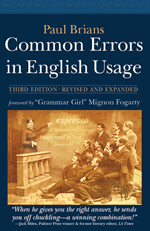coiffeur
yanira.vargasThe guy who does your hair is a “coiffeur,” just as the person who drives a car is a “chauffeur,” and a restaurant owner is a “restaurateur.” The -eursuffix occurs regularly in occupation names which we have borrowed from the French. In French all of these would be male, though Americans often refer to female restaurateurs and chauffeurs. But it’s less acceptable to refer to a female hairdresser as a coiffeur.
When the coiffeur has finished, the end product—your hairdo—is your “coiffure.”
